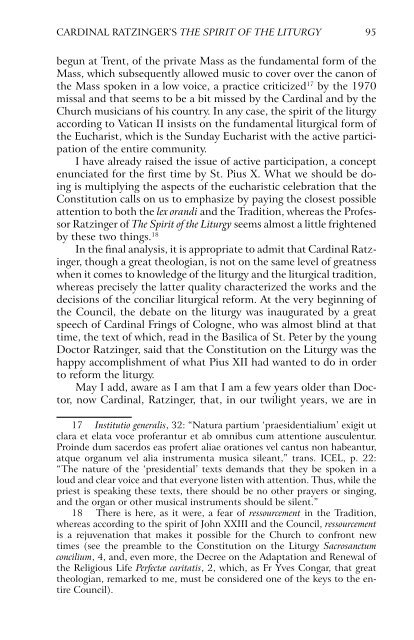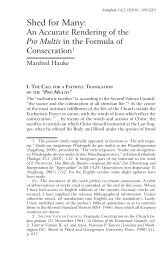Cardinal Ratzinger's The Spirit of the Liturgy: Is It ... - Liturgysociety.org
Cardinal Ratzinger's The Spirit of the Liturgy: Is It ... - Liturgysociety.org
Cardinal Ratzinger's The Spirit of the Liturgy: Is It ... - Liturgysociety.org
You also want an ePaper? Increase the reach of your titles
YUMPU automatically turns print PDFs into web optimized ePapers that Google loves.
CARDINAL RATzINGER’S ThE SPIRIT <strong>of</strong> ThE LITURgy<br />
begun at Trent, <strong>of</strong> <strong>the</strong> private Mass as <strong>the</strong> fundamental form <strong>of</strong> <strong>the</strong><br />
Mass, which subsequently allowed music to cover over <strong>the</strong> canon <strong>of</strong><br />
<strong>the</strong> Mass spoken in a low voice, a practice criticized 7 by <strong>the</strong> 970<br />
missal and that seems to be a bit missed by <strong>the</strong> <strong>Cardinal</strong> and by <strong>the</strong><br />
Church musicians <strong>of</strong> his country. In any case, <strong>the</strong> spirit <strong>of</strong> <strong>the</strong> liturgy<br />
according to Vatican II insists on <strong>the</strong> fundamental liturgical form <strong>of</strong><br />
<strong>the</strong> Eucharist, which is <strong>the</strong> Sunday Eucharist with <strong>the</strong> active participation<br />
<strong>of</strong> <strong>the</strong> entire community.<br />
I have already raised <strong>the</strong> issue <strong>of</strong> active participation, a concept<br />
enunciated for <strong>the</strong> first time by St. Pius X. What we should be doing<br />
is multiplying <strong>the</strong> aspects <strong>of</strong> <strong>the</strong> eucharistic celebration that <strong>the</strong><br />
Constitution calls on us to emphasize by paying <strong>the</strong> closest possible<br />
attention to both <strong>the</strong> lex orandi and <strong>the</strong> Tradition, whereas <strong>the</strong> Pr<strong>of</strong>essor<br />
Ratzinger <strong>of</strong> <strong>The</strong> <strong>Spirit</strong> <strong>of</strong> <strong>the</strong> <strong>Liturgy</strong> seems almost a little frightened<br />
by <strong>the</strong>se two things. 8<br />
In <strong>the</strong> final analysis, it is appropriate to admit that <strong>Cardinal</strong> Ratzinger,<br />
though a great <strong>the</strong>ologian, is not on <strong>the</strong> same level <strong>of</strong> greatness<br />
when it comes to knowledge <strong>of</strong> <strong>the</strong> liturgy and <strong>the</strong> liturgical tradition,<br />
whereas precisely <strong>the</strong> latter quality characterized <strong>the</strong> works and <strong>the</strong><br />
decisions <strong>of</strong> <strong>the</strong> conciliar liturgical reform. At <strong>the</strong> very beginning <strong>of</strong><br />
<strong>the</strong> Council, <strong>the</strong> debate on <strong>the</strong> liturgy was inaugurated by a great<br />
speech <strong>of</strong> <strong>Cardinal</strong> Frings <strong>of</strong> Cologne, who was almost blind at that<br />
time, <strong>the</strong> text <strong>of</strong> which, read in <strong>the</strong> Basilica <strong>of</strong> St. Peter by <strong>the</strong> young<br />
Doctor Ratzinger, said that <strong>the</strong> Constitution on <strong>the</strong> <strong>Liturgy</strong> was <strong>the</strong><br />
happy accomplishment <strong>of</strong> what Pius XII had wanted to do in order<br />
to reform <strong>the</strong> liturgy.<br />
May I add, aware as I am that I am a few years older than Doctor,<br />
now <strong>Cardinal</strong>, Ratzinger, that, in our twilight years, we are in<br />
7 Institutio generalis, 2: “Natura partium ‘praesidentialium’ exigit ut<br />
clara et elata voce pr<strong>of</strong>erantur et ab omnibus cum attentione ausculentur.<br />
Proinde dum sacerdos eas pr<strong>of</strong>ert aliae orationes vel cantus non habeantur,<br />
atque <strong>org</strong>anum vel alia instrumenta musica sileant,” trans. ICEL, p. 22:<br />
“<strong>The</strong> nature <strong>of</strong> <strong>the</strong> ‘presidential’ texts demands that <strong>the</strong>y be spoken in a<br />
loud and clear voice and that everyone listen with attention. Thus, while <strong>the</strong><br />
priest is speaking <strong>the</strong>se texts, <strong>the</strong>re should be no o<strong>the</strong>r prayers or singing,<br />
and <strong>the</strong> <strong>org</strong>an or o<strong>the</strong>r musical instruments should be silent.”<br />
8 <strong>The</strong>re is here, as it were, a fear <strong>of</strong> ressourcement in <strong>the</strong> Tradition,<br />
whereas according to <strong>the</strong> spirit <strong>of</strong> John XXIII and <strong>the</strong> Council, ressourcement<br />
is a rejuvenation that makes it possible for <strong>the</strong> Church to confront new<br />
times (see <strong>the</strong> preamble to <strong>the</strong> Constitution on <strong>the</strong> <strong>Liturgy</strong> Sacrosanctum<br />
concilium, 4, and, even more, <strong>the</strong> Decree on <strong>the</strong> Adaptation and Renewal <strong>of</strong><br />
<strong>the</strong> Religious Life Perfectæ caritatis, 2, which, as Fr yves Congar, that great<br />
<strong>the</strong>ologian, remarked to me, must be considered one <strong>of</strong> <strong>the</strong> keys to <strong>the</strong> entire<br />
Council).<br />
9



